The low profile blue-chip Everonn Systems India Ltd is all set to launch a hugely ambitious national education development blueprint which could revolutionise and alter the character of Indian education. Dilip Thakore reports
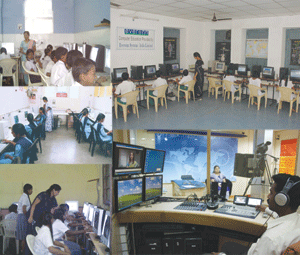 For the growing minority of thinking citizens who have correctly identified its K-Ph D education system as the Achilles leg (the contagion has spread far upward from the heel) of post-independence India’s failed national development effort — almost 400 million Indians are illiterate; 46 percent of children under three years of age are under-nourished; and over 700 million citizens make do with incomes of less than $1 per day — there’s encouraging news from the southern port city of Chennai aka Madras (pop. 4.1 million).
For the growing minority of thinking citizens who have correctly identified its K-Ph D education system as the Achilles leg (the contagion has spread far upward from the heel) of post-independence India’s failed national development effort — almost 400 million Indians are illiterate; 46 percent of children under three years of age are under-nourished; and over 700 million citizens make do with incomes of less than $1 per day — there’s encouraging news from the southern port city of Chennai aka Madras (pop. 4.1 million).
In the relatively quiet suburb of Ashok Nagar of this city, defined by its unique even if contradictory, affinity for kitsch cinema, demigod movie icons, pernicious caste politics and deep intellectualism, the top management of a listed blue-chip but low-profile company operating under the name and style of Everonn Systems India Ltd (ESIL, sales revenue: Rs.91.23 crore in the year ended March 31, 2008) is applying finishing touches to a hugely ambitious national education development blueprint, which will be presented to the public on January 23. If implemented successfully, the company’s Educating India project could revolutionise and alter the character of Indian education. And pitchfork this understated company, which delivers instructional and communication technologies (ICT) to 4,539 K-12 government and private schools in 11 states countrywide, and virtual and technology enabled learning solutions through satellite-based very small aperture terminal technology (Vsat) to 362 colleges and universities, and 388 schools, into the vanguard of the quiet revolution brewing in Indian education.
“To roll out Educating India, on which we have been working for the past two years, ESIL will transform into an accelerator, facilitator, aggregator and manager organisation and engineer the promotion and on-streaming of 3,000 green-field, state-of-the-art, fully ICT and Vsat enabled schools, vocational institutes and professional colleges. We believe we can mobilise investment in new education infrastructure on the required scale by tapping the huge 20 million population of NRIs and PIOs (non-resident Indians and people of Indian origin) living abroad, many of whom are interested in investing in technology-led education facilities for India. And also by motivating a large percentage of India’s 20 million HNIs (high net worth investors) and 3,000 major companies who are the largest users of well-educated youth and talent.
.gif) “Our research indicates that huge numbers within these publics are keen on investing in Indian education, to enable India to reap its demographic advantage of hosting the world’s largest youth population,” says P. Kishore, the visionary promoter-managing director of ESIL, which has been doubling its revenue and net profit every year for the past three years, and has emerged as a darling of investors on the country’s stock exchanges. Currently the company’s equity share listed on the Bombay and National stock exchanges following its IPO in July 2007, when it was over-subscribed a record 145 times, is quoted at Rs.228 in a bearish market.
“Our research indicates that huge numbers within these publics are keen on investing in Indian education, to enable India to reap its demographic advantage of hosting the world’s largest youth population,” says P. Kishore, the visionary promoter-managing director of ESIL, which has been doubling its revenue and net profit every year for the past three years, and has emerged as a darling of investors on the country’s stock exchanges. Currently the company’s equity share listed on the Bombay and National stock exchanges following its IPO in July 2007, when it was over-subscribed a record 145 times, is quoted at Rs.228 in a bearish market.
Kishore believes that given Everonn’s head-start in delivering ICT and Vsat education to over 5,000 education institutions around the country, its fast-growth track record, and his own capability to raise funding (as testified by the massive over-subscription of the company’s IPO), inspiring NRIs, PIOs and domestic HNIs and corporates to invest in rebuilding the country’s education infrastructure, is an eminently feasible proposition.
“Our strategy is to employ ‘triggers’ or motivators — emotional, social and structural — to mobilise massive investment in Indian education over the next five years. The emotional trigger will be used to facilitate investment in schools, colleges, libraries, laboratories etc by NRIs, PIOs and HNIs for sentimental reasons such as in commemorating remembrance of loved ones; the social trigger will inspire groups, trusts and foundations already providing education, and the structural trigger will remind promoters of SEZs (special economic zones), new townships, industrial parks etc of the need to establish in-house or neighbourhood schools and colleges. Under the Educating India initiative, Everonn will conceputalise, plan, build and if required manage, the 3,000 new K-12 schools, vocational institutes and professional colleges envisaged by the project during the next five years,” says Kishore who is confident he can catalyse this societal mindset revolution because there is “a new consensus in Indian society on the critical importance of technology-enabled education for national development”.
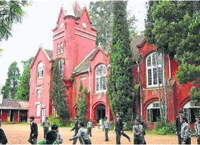 Quite obviously Kishore’s confidence in his ability to sell ESIL’s massive education infrastructure development plan to various publics in India and abroad flows from the company’s brilliant growth record. In 1987, inspired by the vision of tech-savvy prime minister Rajiv Gandhi, Kishore, the son of a forest department officer, quit his job as an IT consultant in Kochi (Kerala) to establish India’s first computer education lab with four computers at an investment of Rs.1.15 lakh in the government-aided Breeks Memorial School, Ootacamund, his alma mater. In the cool climes of this scenic hill station, Kishore established India’s first school computer education lab, under the then revolutionary BOOT (build, own, operate and transfer) model. “I was driven by the simple belief that India’s future depends upon the country’s huge child population being weaned away from being ‘taught’ and enabled to ‘learn’,” he recalls.
Quite obviously Kishore’s confidence in his ability to sell ESIL’s massive education infrastructure development plan to various publics in India and abroad flows from the company’s brilliant growth record. In 1987, inspired by the vision of tech-savvy prime minister Rajiv Gandhi, Kishore, the son of a forest department officer, quit his job as an IT consultant in Kochi (Kerala) to establish India’s first computer education lab with four computers at an investment of Rs.1.15 lakh in the government-aided Breeks Memorial School, Ootacamund, his alma mater. In the cool climes of this scenic hill station, Kishore established India’s first school computer education lab, under the then revolutionary BOOT (build, own, operate and transfer) model. “I was driven by the simple belief that India’s future depends upon the country’s huge child population being weaned away from being ‘taught’ and enabled to ‘learn’,” he recalls.
Equipped with a high-potential idea, savings of mere Rs.4,000 and a bank guarantee furnished by a sympathetic equipment supplier (Eiko Computers’ Mr. Nerula), Kishore began his historic enterprise with four students of Breeks Memorial who signed up for computer education at a fee of Rs.100 per month. “In those days computers were new and inspired great respect. By the end of the first academic year, 700 students signed up to learn,” remembers Kishore.
Word spread fast in the small and picturesque town of Ooty (pop.94,000), famous for hosting a sizeable number of high-end, British-inspired boarding schools. By the end of 1988, Kishore, then operating under the aegis of a partnership firm named Systems International, had set up computer labs in seven upmarket boarding schools, including Good Shepherds International and Lawrence, Lovedale. In 1989, the firm ventured downwards from the Nilgiri hills to the plains of peninsular India and established computer science learning labs in the towns of Coimbatore, Tirupur, Palghat, Mysore and Kochi.
Thus proceeding cautiously, by the year 2000 Systems International had installed over 75 computer education labs in private schools across south India, with over 300,000 fee-paying students signed up to learn how to use the wonder business and communications machine — the personal computer. “Even though the concept and acronym were unknown then, we had developed the BOOT model for spreading computer education,” reminisces Kishore.
 However, Kishore and systems International’s big break came in 1999 when Tamil Nadu became the first state of the Indian Union to introduce computer science education in 17 government schools. Encouraged by the experiment, in the millennium year the state government invited bids for the establishment of computer labs in another 600 government schools across the state. With inspired financial engineering and help of friends and investors (notably Arun Kumar Pillai of Strides Arco Labs, Bangalore), Kishore mobilised the massive investment plus earnest money deposit (Rs. 21 crore) demanded by the TN government from bidders, and submitted Systems International’s bid to set up computer labs in 333 government schools. The firm’s bid was successful and it was awarded a contract to establish computer labs on the BOOT model in 332 government schools statewide. “We hired 750 people and trained them within seven days to install our computer labs in the 332 government schools within 30 days,” he recalls.
However, Kishore and systems International’s big break came in 1999 when Tamil Nadu became the first state of the Indian Union to introduce computer science education in 17 government schools. Encouraged by the experiment, in the millennium year the state government invited bids for the establishment of computer labs in another 600 government schools across the state. With inspired financial engineering and help of friends and investors (notably Arun Kumar Pillai of Strides Arco Labs, Bangalore), Kishore mobilised the massive investment plus earnest money deposit (Rs. 21 crore) demanded by the TN government from bidders, and submitted Systems International’s bid to set up computer labs in 333 government schools. The firm’s bid was successful and it was awarded a contract to establish computer labs on the BOOT model in 332 government schools statewide. “We hired 750 people and trained them within seven days to install our computer labs in the 332 government schools within 30 days,” he recalls.
Since then there’s been no looking back for Kishore, who in the millennium year re-christened his firm Everonn Systems India Ltd. Currently ESIL provides computer education, computer aided learning, teacher training and satellite-based virtual and technology enabled teaching and learning solutions to 4,442 government schools, 388 private K-12s, and 362 colleges in 24 states across the country, a business mix which is all set to more than double the company’s sales revenue to Rs.190 crore in the fiscal year ending March 31, 2009.
 More specifically, currently the company’s education enhancement services are delivered through six SBUs (strategic business units) — ICT in government schools, and five broad-spectrum virtual and technology enabled learning solutions (vitels) to private schools and colleges. “Moreover the company also provides retail training and testing services to students preparing for public exams such as TOEFL and CAT through its 29 retail learning centres in ten states, which are connected through Vsat with ESIL’s seven broadcasting studios in Chennai. In addition we have a web product — Classontheweb — which provides curriculum mapped content through the internet to subscriber students enrolled in CISCE, CBSE and Tamil Nadu Matriculation Board schools. The company’s business mix is rounded off with Eduresources, which provides teacher training and related services to schools and colleges. In short, ESIL is well on its way to becoming a full services provider to the education sector,” says Susha John, an applied maths and computer science postgraduate of the PSG College of Technology, who signed up with Kishore ab initio in 1987, and is currently executive director of ESIL, supervising the business development of the company’s six SBUs, whose activities are promoted by a sales force of 250 personnel.
More specifically, currently the company’s education enhancement services are delivered through six SBUs (strategic business units) — ICT in government schools, and five broad-spectrum virtual and technology enabled learning solutions (vitels) to private schools and colleges. “Moreover the company also provides retail training and testing services to students preparing for public exams such as TOEFL and CAT through its 29 retail learning centres in ten states, which are connected through Vsat with ESIL’s seven broadcasting studios in Chennai. In addition we have a web product — Classontheweb — which provides curriculum mapped content through the internet to subscriber students enrolled in CISCE, CBSE and Tamil Nadu Matriculation Board schools. The company’s business mix is rounded off with Eduresources, which provides teacher training and related services to schools and colleges. In short, ESIL is well on its way to becoming a full services provider to the education sector,” says Susha John, an applied maths and computer science postgraduate of the PSG College of Technology, who signed up with Kishore ab initio in 1987, and is currently executive director of ESIL, supervising the business development of the company’s six SBUs, whose activities are promoted by a sales force of 250 personnel.
Presciently over the past decade since ESIL gathered serious momentum, Kishore and his core team have invested heavily in developing the company’s technological capability and human resources which offer a stable platform for the launch of the company’s unprecedented Educating India initiative on January 23. A case in point is Everonn’s Knowledge Research Development and Research (KRDR) division, which employs a 65-strong content development team comprising 35 teachers and 30 managers, who develop curriculum mapped and supplementary content delivered through latest information communi-cation technologies to schools, colleges, corporates and retail customers.
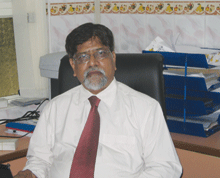 “A wide range of multimedia study material including digital, Vsat, intranet and web-based content has been developed by this division, which has contributed to significantly improved learning outcomes in over 5,000 K-12 schools and colleges across the country. Content developed for schools is curriculum-based and can be customised by teachers for students with differing levels of learning capability. Teams of research associates, teachers, content developers and animators work together to analyse, visualise and convert textbook content from various sources into appropriate digital formats before presenting it in e-learning mode. Moreover for college students we offer generic courses to develop soft skills, computer basics, personality develop-ment etc to make graduates readily employable. For Indian industry, we conduct commissioned research studies to identify knowledge and skill gaps and devise study programmes to fill them. We also have a partnership with Anna University to offer domain specific courses such as bioinformatics, which we customise to industry requirements and relay through Vsat. Shortly we will be launching our own executive development programmes and a finishing school for new industry recruits. As you can see, this is a very busy division of the company,” says Dr. V.S.R. Vijayakumar, former professor of HRD at the Kirloskar Institute of Advanced Management Studies, Harihar (Karnataka) and associate dean of the ICFAI Business School, Chennai who signed up with ESIL in the summer of 2006 and is currently the dean of the KRDR division of the company.
“A wide range of multimedia study material including digital, Vsat, intranet and web-based content has been developed by this division, which has contributed to significantly improved learning outcomes in over 5,000 K-12 schools and colleges across the country. Content developed for schools is curriculum-based and can be customised by teachers for students with differing levels of learning capability. Teams of research associates, teachers, content developers and animators work together to analyse, visualise and convert textbook content from various sources into appropriate digital formats before presenting it in e-learning mode. Moreover for college students we offer generic courses to develop soft skills, computer basics, personality develop-ment etc to make graduates readily employable. For Indian industry, we conduct commissioned research studies to identify knowledge and skill gaps and devise study programmes to fill them. We also have a partnership with Anna University to offer domain specific courses such as bioinformatics, which we customise to industry requirements and relay through Vsat. Shortly we will be launching our own executive development programmes and a finishing school for new industry recruits. As you can see, this is a very busy division of the company,” says Dr. V.S.R. Vijayakumar, former professor of HRD at the Kirloskar Institute of Advanced Management Studies, Harihar (Karnataka) and associate dean of the ICFAI Business School, Chennai who signed up with ESIL in the summer of 2006 and is currently the dean of the KRDR division of the company.
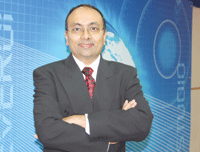 Continuous content development, curriculum mapping and concept-ualisation of market-driven study programmes backed by massive investment in technology development, has prepared ESIL to realise its top management’s dream to dramatically improve teaching-learning outcomes in the country’s classrooms and roll out the company’s ambitious Educating India project. “During the past decade, ESIL has developed advanced technology-driven total enterprise solutions to the extent that we are able to take 360 degree views of our own company and external education institutions. As a result we are fully equipped to develop high-quality content and deliver it through numerous channels including the internet, Vsat, television and 3G mobile phones. Cutting edge technology enables us to involve all stakeholders in education — students, teachers, peers and parents for effective learning. Therefore I am confident that ESIL is well-qualified to roll out and attain the ambitious goals of the Educating India project,” says G.S. Vidyashankar, an industrial engineering alumnus of REC, Allahabad and University of Iowa City (USA), who acquired over 15 years business management experience with blue-chip corporates such as Citibank India, HCL and Cognizant Technologies prior to signing up as head of technology and business processes at ESIL in 2006.
Continuous content development, curriculum mapping and concept-ualisation of market-driven study programmes backed by massive investment in technology development, has prepared ESIL to realise its top management’s dream to dramatically improve teaching-learning outcomes in the country’s classrooms and roll out the company’s ambitious Educating India project. “During the past decade, ESIL has developed advanced technology-driven total enterprise solutions to the extent that we are able to take 360 degree views of our own company and external education institutions. As a result we are fully equipped to develop high-quality content and deliver it through numerous channels including the internet, Vsat, television and 3G mobile phones. Cutting edge technology enables us to involve all stakeholders in education — students, teachers, peers and parents for effective learning. Therefore I am confident that ESIL is well-qualified to roll out and attain the ambitious goals of the Educating India project,” says G.S. Vidyashankar, an industrial engineering alumnus of REC, Allahabad and University of Iowa City (USA), who acquired over 15 years business management experience with blue-chip corporates such as Citibank India, HCL and Cognizant Technologies prior to signing up as head of technology and business processes at ESIL in 2006.
Yet perhaps the most encouraging external development for the top brass of ESIL, is an emerging nationwide consensus — in government and private sector education — about the need to utilise ICT and distance learning technologies in the country’s primary, secondary and higher education classrooms. This is testified not only by the annual increase of 103 percent in the number of schools signing up to avail Everonn’s ICT services under the BOOT model, and the multiplication of students availing its education services under Vsat from 400 in 2005-06 to 90,267 currently, but also in the annual revenue inflow and operating profits of the company which have been doubling every year for the past two years, and are expected to double again to Rs.190 crore and Rs.31 crore respectively, in the year ending March 31, 2009. Little wonder, knowledgeable investors in the bourses have reposed massive faith in ESIL. When the company went public in July 2007, its IPO (initial public offer) was over-subscribed a record 145 times.
 “Fortunately, there is rapidly rising awareness in government and society that the massive task of educating the country’s huge child population of 450 million is not possible without major private sector participation. Delivery of good quality, technology-enabled education to the nation’s under-served children has become a people’s movement. This is the explanation for the great enthusiasm for Everonn’s IPO last year. With over 31,000 shareholders we regard ourselves as a people’s company. This is the inspiration behind our high-potential Educating India project. No other company in the education sector has the management and technology bandwidth to implement this huge, unprecedented plan,” says R. Kannan, a commerce graduate of Madras University and professional chartered accountant who allied with Kishore ab initio in 1986, and managed the firm and company’s finance portfolio until he formally came aboard as executive director (finance and business development) last year.
“Fortunately, there is rapidly rising awareness in government and society that the massive task of educating the country’s huge child population of 450 million is not possible without major private sector participation. Delivery of good quality, technology-enabled education to the nation’s under-served children has become a people’s movement. This is the explanation for the great enthusiasm for Everonn’s IPO last year. With over 31,000 shareholders we regard ourselves as a people’s company. This is the inspiration behind our high-potential Educating India project. No other company in the education sector has the management and technology bandwidth to implement this huge, unprecedented plan,” says R. Kannan, a commerce graduate of Madras University and professional chartered accountant who allied with Kishore ab initio in 1986, and managed the firm and company’s finance portfolio until he formally came aboard as executive director (finance and business development) last year.
Yet despite everonn’s pioneering role and impressive track record in infusing ICT into Indian education, the Delhi/Gurgaon-based Educomp Systems Ltd, its major competitor in ICT-driven education delivery services, has a larger annual sales revenue (Rs.276.90 crore in fiscal 2007-08), and a longer clients list (7,300 government and 1,200 private schools) than ESIL. Moreover not only has it a higher public profile, it is also more fancied by investors (see EW cover story June 2008) as evidenced by its higher market capitalisation (Rs.4,141 crore cf. Everonn’s Rs.345 crore on December 30).
 Nevertheless not a few independent monitors of the IT industry believe that the Chennai-based company has several inherent strengths and advantages which will soon transform it into a prime mover and leader in India’s rapidly growing education services marketplace. Among them: first mover’s advantage (ESIL established its first school-based ICT lab in 1986 cf. Educomp in 1994); ESIL introduced its Vsat services (“currently the largest corporate Vsat network worldwide”) in 2002 cf. Educomp in 2008. Moreover Everonn is perceived to have greater top management bandwidth. “Whereas Educomp’s directors are all family members, the Everonn board of directors comprises seasoned professionals who have been with the company right from the start and have fantastic domain knowledge. Now with the imminent roll out of its Educating India project, ESIL which has hitherto been a very low-profile company, is poised to become the market leader in the ICT-driven education services business,” says a Bangalore-based IT consultant who offered his views on condition of anonymity.
Nevertheless not a few independent monitors of the IT industry believe that the Chennai-based company has several inherent strengths and advantages which will soon transform it into a prime mover and leader in India’s rapidly growing education services marketplace. Among them: first mover’s advantage (ESIL established its first school-based ICT lab in 1986 cf. Educomp in 1994); ESIL introduced its Vsat services (“currently the largest corporate Vsat network worldwide”) in 2002 cf. Educomp in 2008. Moreover Everonn is perceived to have greater top management bandwidth. “Whereas Educomp’s directors are all family members, the Everonn board of directors comprises seasoned professionals who have been with the company right from the start and have fantastic domain knowledge. Now with the imminent roll out of its Educating India project, ESIL which has hitherto been a very low-profile company, is poised to become the market leader in the ICT-driven education services business,” says a Bangalore-based IT consultant who offered his views on condition of anonymity.
Meanwhile, tacitly admitting that the company has unwarrantedly maintained a low profile incommensurate with its business development record and sound financials, Everonn’s top management is all set to launch a national marketing and brand development blitzkrieg. And to mastermind its brand promotion strategy, ESIL has signed up Dr. Tapan K. Panda, an academic heavyweight with formidable qualifications, for the job. A business management Ph D of Utkal University (Orissa), Panda worked with several advertising agencies before switching to academia. During the past 15 years he has served as professor of marketing at IIM-Kozhikode, IIM-Lucknow and IIM-Indore while also authoring 15 books on marketing and management, before signing up with Everonn in September this year.
 Designated president of marketing and corporate affairs, Panda has been given charge of all marketing initiatives of the company, including corporate brand development, and corporate and marketing communications. Within a month of assuming office, on October 1, Panda rolled out the company’s first major CSR (corporate social responsibility) initiative, to introduce computer aided learning and interactive curriculum support to 1,000 secondary and higher secondary rural schools across India within the time limit of 1,000 days. “My objective is to design marketing strategies and develop business processes which will accelerate the growth of ESIL into a major education brand in the country. This is possible through our Educating India project, promotion of an Everonn virtual B-school which will network all of India’s 1,500 B-schools and maintenance of current annual rates of growth in our legacy ICT and Vsat-driven businesses,” says Panda.
Designated president of marketing and corporate affairs, Panda has been given charge of all marketing initiatives of the company, including corporate brand development, and corporate and marketing communications. Within a month of assuming office, on October 1, Panda rolled out the company’s first major CSR (corporate social responsibility) initiative, to introduce computer aided learning and interactive curriculum support to 1,000 secondary and higher secondary rural schools across India within the time limit of 1,000 days. “My objective is to design marketing strategies and develop business processes which will accelerate the growth of ESIL into a major education brand in the country. This is possible through our Educating India project, promotion of an Everonn virtual B-school which will network all of India’s 1,500 B-schools and maintenance of current annual rates of growth in our legacy ICT and Vsat-driven businesses,” says Panda.
Indeed, even as ESIL directors reinvent the company as an across-the-education-spectrum “accelerator, aggregator, facilitator, and manager” under its path-breaking Educating India project, this initiative based upon the investment of players external to the company, is likely to take time to gather momentum. In the meanwhile the company’s scorching pace of growth will have to be maintained by its legacy businesses — ICT-driven content development, and delivery of high quality vocational and professional programmes through its continuously expanding Vsat network for the tertiary sector. And the auguries for both these legacy businesses are good.
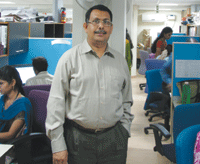 “Currently ESIL has installed 25 percent of the 25,000 computer labs set up in government schools across the country. Against this the Union HRD ministry’s target is to equip 640,000 government schools with ICT infrastructure during the Eleventh Plan period (2007-12). Assuming we maintain our 25 percent market share, we will have installed our high quality computer labs at an average price of Rs.8 lakh in 160,000 schools, to whom we will also be delivering content, teacher training and consumables such as paper, CDs, printer ribbons etc. I leave you to do the math,” says M. Chandrabanu, a law and commerce graduate of Mangalore University who signed up with Systems International (ESIL’ predecessor in title) in 1990, and is currently vice president of Everonn’s ICT division which rakes in one-third of the company’s annual revenue.
“Currently ESIL has installed 25 percent of the 25,000 computer labs set up in government schools across the country. Against this the Union HRD ministry’s target is to equip 640,000 government schools with ICT infrastructure during the Eleventh Plan period (2007-12). Assuming we maintain our 25 percent market share, we will have installed our high quality computer labs at an average price of Rs.8 lakh in 160,000 schools, to whom we will also be delivering content, teacher training and consumables such as paper, CDs, printer ribbons etc. I leave you to do the math,” says M. Chandrabanu, a law and commerce graduate of Mangalore University who signed up with Systems International (ESIL’ predecessor in title) in 1990, and is currently vice president of Everonn’s ICT division which rakes in one-third of the company’s annual revenue.
Likewise the business prospects of the company’s virtual and technology enabled learning solutions division, which provides education and training solutions via satellite-based Vsat (very small aperture technology) technology, are also very bright against the backdrop of a new, re-energised learning revolution beginning to sweep through Indian academia. Already ESIL’s college initiatives division has established a presence in 362 colleges in 14 states across India, offering the company’s non-curriculum courses such as English enhancement, personality and soft skills development and software testing, bioinformatics, at fees ranging between Rs.850-40,000 per programme.
Now taking a cue from the success of its ICT business development model, ESIL’s college education division has drawn up a plan to establish Vsat-connected Everonn Learning Academies under the BOOT model, targeting an aggregate enrollment of 25,000 students within the next 24 months. And to spearhead this ambitious high-potential collegiate initiative, in April 2007, the company signed up N. Prabhakar Naidu, a commerce graduate of the Indian Institute of Management and Commerce, Hyderabad who brings with him business management and development skills honed in several blue-chip multinationals including Philips, Bharat-Shell and Exxon-Mobil.
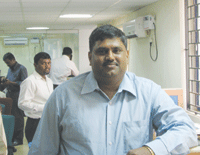 “Thus far we have established our presence in 362 colleges in 14 states offering non-curriculum soft skills development programmes through Vsat. Now we are in the process of setting up Everonn Learning Academies, which will offer curriculum related products such as engineering and maths lectures through our Vsat technology. This initiative will enable colleges across the country to access the best subject lecturers and teachers in India. The academies will offer fully wired Vsat linked classrooms on the BOOT model to college students paying monthly user fees for accessing curriculum mapped and other programmes. And given that each academy will enroll 60-100 students per classroom and that there are 17,000 colleges in the country, the business prospects of this division are excellent,” says Naidu who is served by a 90-strong team of sales personnel across the country, marketing this novel supplementary education concept to college managements.
“Thus far we have established our presence in 362 colleges in 14 states offering non-curriculum soft skills development programmes through Vsat. Now we are in the process of setting up Everonn Learning Academies, which will offer curriculum related products such as engineering and maths lectures through our Vsat technology. This initiative will enable colleges across the country to access the best subject lecturers and teachers in India. The academies will offer fully wired Vsat linked classrooms on the BOOT model to college students paying monthly user fees for accessing curriculum mapped and other programmes. And given that each academy will enroll 60-100 students per classroom and that there are 17,000 colleges in the country, the business prospects of this division are excellent,” says Naidu who is served by a 90-strong team of sales personnel across the country, marketing this novel supplementary education concept to college managements.
Against this backdrop of winds of an overdue genuine (rather than ritual) learning revolution beginning to gather momentum across the subcontinent, it’s hardly surprising that on the eve of the public unveiling of ESIL’s Educating India project, which could well mobilise over Rs.25,000 crore for investment, ESIL’s visionary promoter-chief executive P. Kishore is optimistic about the future of Indian education.
“India is poised to attain the QEFA (quality education for all) objective in the near future. For the first time in our history the majority of the population is young, and loaded with self-belief and idealism. This generation is not content with being taught prescribed curriculums; it wants to actively learn subjects of its choice. Fortunately now we have the benefit of 21st century technologies which can reach and deliver meaningful, vocation-oriented content directly to students countrywide. Everonn’s Educating India project is a giant step towards realisation of the QEFA ideal and will catalyse the transformation of the education landscape of India,” predicts Kishore.
In the contemporary world’s most educationally under-served democracy, it’s an initiative that must be enabled to succeed.
With Hemalatha Raghupathi in Chennai